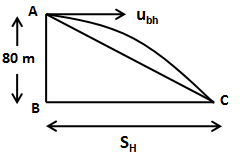Question
Question: At the height of 80 m, an airplane is moving with 150 m/s. A bomb is dropped from it so as to hit a ...
At the height of 80 m, an airplane is moving with 150 m/s. A bomb is dropped from it so as to hit a target. At what distance from the target should the bomb be dropped?
(Giveng=10m/s2)
A. 605.3 m
B. 600 m
C. 80 m
D. 230 m
Solution
Using a kinematic equation, determine the time taken by the bomb to hit the target. Then determine the horizontal distance travelled by the bomb by using the kinematic equation in the horizontal direction. Refer to the geometry of the motion of the bomb to calculate the total distance travelled by the bomb.
Formula used:
s=ut+21at2
Here, s is the displacement, u is the initial vertical velocity, g is the acceleration due to gravity and t is the time.
Complete step by step answer:
We have given the velocity of airplane is v=150m/s and therefore, the initial velocity of the bomb will the velocity of the airplane that is ub=150m/s.
Let’s draw the motion of the bomb as shown in the figure below.

In the above figure, ubh is the initial horizontal velocity of the bomb and SH is the horizontal distance travelled by the bomb.
The total distance covered by the bomb is AC.
We can use the kinematic equation to determine the time taken by the bomb to hit the target as follows,
SV=ubvt+21gt2
Here, ubv is the initial vertical velocity of the bomb, g is the acceleration due to gravity and t is the time.
Since the beginning, the bomb has only a horizontal component of velocity. Therefore, the initial vertical velocity of the bomb is zero.
SV=21gt2
⇒t=g2SV
Substituting 80 m for SV and 10m/s2 for g in the above equation, we get,
t=102(80)
⇒t=4s
Now, we can use the kinematic equation in the horizontal direction of motion of the bomb to determine the horizontal distance SH.
SH=ubht
Substituting 150 m/s for ubh and 4 s for t in the above equation, we get,
SH=(150)(4)
⇒SH=600m
Now, from the geometry of the above figure, we can calculate the distance AC as,
AC=SV2+SH2
Substituting 80 m for SV and 600 m for SH in the above equation, we get,
AC=(80)2+(600)2
⇒AC=605.3m
Therefore, the bomb has to be dropped 605.3 m from the target.
So, the correct answer is “Option A”.
Note:
While solving these types of questions, the direction of motion is very important. For the downward motion, the acceleration due to gravity, distance and velocity should be negative. The bomb dropped from the airplane will follow the projectile motion and therefore, the distance AC that we have calculated will be slightly less than the original distance covered by the bomb.
